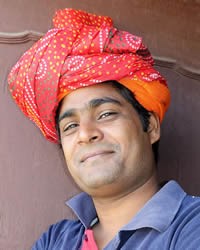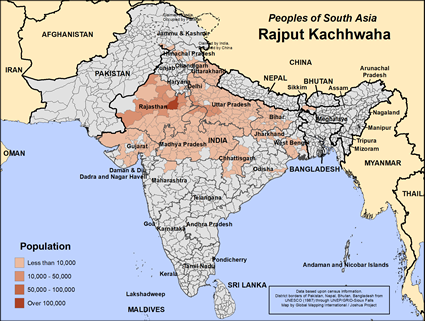Rajput Kachhwaha in India

Photo Source:
Copyrighted © 2026
Kerry Olson All rights reserved. Used with permission |

Map Source:
People Group data: Omid. Map geography: UNESCO / GMI. Map Design: Joshua Project.
|
| People Name: | Rajput Kachhwaha |
| Country: | India |
| 10/40 Window: | Yes |
| Population: | 718,000 |
| World Population: | 718,000 |
| Primary Language: | Hindi |
| Primary Religion: | Hinduism |
| Christian Adherents: | 0.00 % |
| Evangelicals: | 0.00 % |
| Scripture: | Complete Bible |
| Ministry Resources: | Yes |
| Jesus Film: | Yes |
| Audio Recordings: | Yes |
| People Cluster: | South Asia Forward Caste - Rajput |
| Affinity Bloc: | South Asian Peoples |
| Progress Level: |
|
Introduction / History
Kachhwaha is a Rajput clan found primarily in India. They claim to be descendants of Kusha, hence from the Suryavanshi (Solar) dynasty. The Kachhwahas ruled the Kingdom of Amber in present-day Rajasthan, India. The Kachhwahas claim descent from Kusha, son of the Hindu God Rama. According to James Mills, the ancestors of the Kachhwaha Rajputs had migrated from Kosala and established a new dynasty at Gwalior and later migrated to Rajasthan. T.H. Hendley states in his Rulers of India and the Chiefs of Rajputana (1897), that the Kachwaha clan is believed to have settled in an early era at Rohtas (Rahatas) on the Son River in present-day Bihar. He notes that their notable seats of power were Kutwar, Gwalior, Dubkhund, Simhapaniya and Narwar (Nalapura) (all in present-day Madhya Pradesh). Historians associate Dulha Rao, the founder of the Jaipur-Kachhwaha lineage, with the Kachchhapaghata dynasty of 10th century. According to Rima Hooja, the Kachhwahas were initially referred to by names such as Kachhapaghata, Kachwaha and Katsawaha. The variant Kachawa became popular in the late 16th century during the reign of Raja Man Singh, a Mughal Subahdar of Bihar Subah (1587-1594), and of Bengal Subah (1595-1606. Several inscriptions and manuscripts, such as those found in Balvan, Chatsu, Sanganer, and Rewasa, are cited in support of this theory.
There are approximately 71 subclans of the Kachhwahas. The prominent ones are: Rajawat - The Rajawats hold the right of succession to the Jaipur throne, and the Maharaja of Jaipur belongs to this subclan. Shekhawat - Descendants of Rao shekha. Naruka - Descendants of Rao Naru. Nathawat - Descendants of rao natha. Khangarot- Descendants of Rao khangar.
What Are Their Lives Like?
Kachhwaha Rajputs live at the highest level of Indian society. They are wealthy and powerful in the sections of India where they live. They encourage their children to pursue higher education. The Kachwaha are patrons of Hindu temples and give generously to Hindu causes. Families arrange marriages with the consent of the young people. Brahmins perform important life rituals at births, weddings and funerals. Sons inherit property from their fathers with the eldest son gaining his father's title and home. Some Rajput Rathor are vegetarians while others eat meat except for beef.
What Are Their Beliefs?
The Kachhwaha Rajput are Hindu, the ancient national religion and culture of India. The Kachwaha worship and serve the many gods of the Hindu pantheon. They pay special attention to Shiva whom many consider the supreme god. Durga, the warrior-mother goddess and wife of Shiva, is worshipped in her many temples. The Kachhwahas celebrate the Hindu holidays such as Holi, the festival of colors, Diwali, the festival of light, Navratri, the nine-day celebration of autumn and Durga Puja, the festival which commemorates the goddess' victory over the evil buffalo spirit.
What Are Their Needs?
The Rajputs must see themselves as sinners and in need of a Savior. They need to hear a clear presentation of the gospel in a way they can understand. They must realize that Shiva and Durga will never save them from their sins. They need to see the love and mercy of Christ lived out in a real way before them.
Prayer Points
Pray that the Lord humbles the Kachhwaha Rajput and that they hunger and thirst for the spiritual truth given only in the Bible.
Pray that God sends Christ followers to befriend the Kachhwahas and share the good news with them.
Pray that God wins many Kachhwaha Rajput to himself and churches begin in this significant people group of India.
Pray that strong movements to Jesus will bring whole Kachhwaha families into rich experiences of God's blessings.
Pray that many of the Kachhwaha people will come to love God with their whole being and walk in his ways.